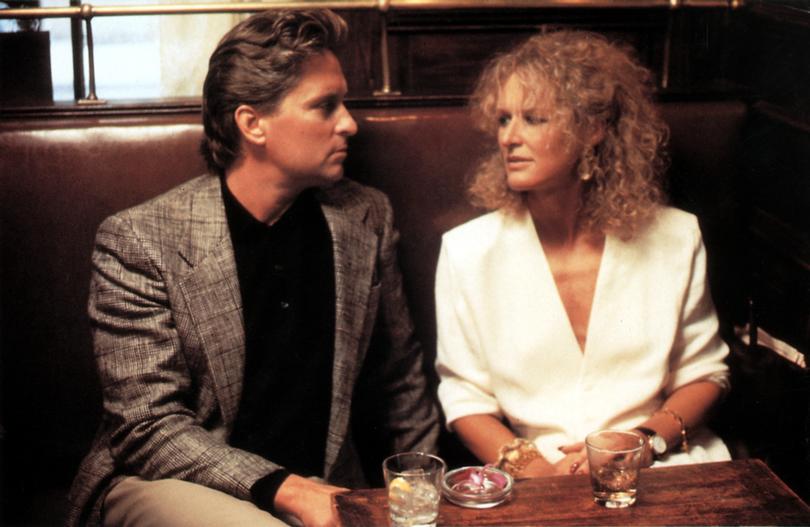KATE EMERY: Baby Reindeer illustrates how men — as well as women — suffer under the patriarchy
KATE EMERY: What makes this depiction of male trauma, vulnerability and masculinity in crisis feel so vital is the way in which it wrestles with the idea of an imperfect victim.

It’s time to retire the term “bunny boiler”.
The way we talk about women who stalk men has evolved past it and here’s the proof: the number one show on Netflix right now is a darkly comedic exploration of male victimisation called Baby Reindeer.
It’s a modern, much-needed depiction of why men can struggle to report violence and it should be the portrayal of male trauma that kills off “bunny boiler” for good.
Sign up to The Nightly's newsletters.
Get the first look at the digital newspaper, curated daily stories and breaking headlines delivered to your inbox.
By continuing you agree to our Terms and Privacy Policy.If the characters portrayed by Michael Douglas and Glenn Close in Fatal Attraction — the 1987 film that gave us the term — had a baby it would be 37. That’s not far off the age of Richard Gadd, the Scottish comedian who created and stars in Baby Reindeer.
It tells a fictionalised version of Gadd’s real-life experience of being stalked by a woman after an amicable encounter at the pub.
In the show “Martha” sends Gadd’s “Donny” thousands of emails, follows him home, and turns up to his comedy gigs. She harasses his family and ultimately turns violent, both against him and his on-again-off-again girlfriend.
In one confrontation she gropes Donny in an alleyway, leaving him reeling less with anger than shame.
“Why did I freeze? Why did I just let it happen?” he asks himself.

It’s a victim-blaming tale as old as time. It’s just that we don’t often hear a man asking himself these questions.
Most people in Donny’s life don’t take his stalker very seriously.
His ex-girlfriend is sceptical, suggesting: “You would have done something to bring this on.”
His friends and co-workers treat Martha as a faintly embarrassing admirer, not a predator. There’s an assumption that this frumpy, older middle-aged woman must be harmless and that Donny, a presumed-straight man, must hold all the power.
When Donny eventually reports Martha to the police he’s asked why it took him so long, before being told the police can’t do anything without a “credible threat”.
“If I was a young woman and a 40-year-old man kept emailing stuff about wanking, would that be a credible threat?” he asks.
Quite.
What makes this depiction of male trauma, vulnerability and masculinity in crisis feel so vital is the way in which it wrestles with the idea of an imperfect victim.
Donny isn’t a “perfect victim” and it’s not just because he’s a man.
Flattered by Martha’s attention, for reasons that become clearer as the series progresses, he alternates between feeling sorry for her, furious with her and even attracted to her. At times he behaves in a way that only encourages her. (I binged the series over two nights and am astonished my neighbours didn’t do a welfare check, given how many times I shouted “no, Donny!” at the screen).
When he experiences sexual violence he’s under the influence of some Keith Richards-level drugs.
It’s a nuanced fictional portrayal of what trauma does to a person that we’ve seen plenty of times when the victim is a woman. Not so much when it’s a man.
The elephant (bunny?) in the room, as I write this column, is that women are overwhelmingly more likely to be the victims of stalking or sexual violence and men are overwhelmingly more likely to be the perpetrators. Male violence against women is an epidemic. That is a given.
But acknowledging that men can be victims doesn’t require pretending that female victims don’t exist. Moreover, at its core, Baby Reindeer is grappling with extremely timely ideas about modern masculinity, what it means to be a man and how men — as well as women — suffer under the patriarchy.
By the way, if this all sounds as much fun as a razorblade colonoscopy, Baby Reindeer is also very amusing, so long as your idea of a laugh is watching a comedian be relentlessly heckled by a woman shouting about him wanting to have sex with “my bumhole!” (And, if it isn’t, what’s wrong with you?)

Fatal Attraction was a cautionary keep-it-in-your-pants tale to men everywhere: that gorgeous career woman who seems to promise no-strings-attached sex might just become emotionally unstable and murderous when you ghost her afterwards.
Martha is no bunny boiler, but nor is Donny a man in the mould of Douglas, who emerges from his stalking experience with no visible trauma in sight: his stalker is dead, his terrific head of hair intact and his wife seems perfectly willing to welcome him back to the bosom of his nuclear family.
Baby Reindeer is a cautionary tale in its own way.
But it’s not about the dangers of offering kindness and empathy to the slightly-weird lady sitting alone at a bar, lest she wind up shouting about anal sex in the crowd at your comedy gig.
It’s about the dangers of letting society’s messed-up stereotypes about masculinity, violence and what a victim should look and act like stop us from taking male victimisation and trauma seriously.
1800 RESPECT (1800 737 732)
